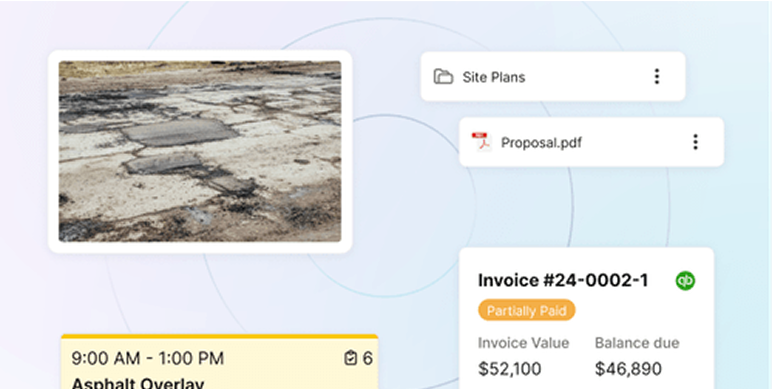Procore Reviews: Features, Pricing, and Our Honest Take in 2026
Procore is very popular in construction management conversations, but does it deliver value for your business? Most contractors struggle with Procore's complexity and hidden costs that balloon beyond initial quotes.
After analyzing Procore software reviews, competitor insights, and real user feedback while comparing Procore construction software against alternatives like OneCrew, I've uncovered that Procore delivers enterprise-grade complexity designed for massive projects.
However, most contractors desperately need streamlined takeoffs, scheduling, and job costing tools instead.
Procore software's core features include project dashboards, document control, financial tracking, and mobile field tools, but it’s overwhelming for smaller teams. Annual costs span $12,000 to $100,000+.
What is Procore?

Procore is a cloud-based construction management platform that connects project teams, documents, and workflows in one digital workspace. The platform handles project management, financials, quality control, and field productivity for construction companies ranging from small contractors to billion-dollar enterprises.
Procore works well for massive general contractors managing complex builds, but often overwhelms smaller specialty contractors who need simpler, faster tools.
Most Procore software reviews highlight the platform's ambitious scope, though Procore’s system requires significant investment in both time and money to leverage its full potential.
Remember: When evaluating Procore software, consider whether your business needs enterprise-level complexity or if a streamlined alternative better fits your workflow.
Procore Key Features
Procore packs tons of features into its platform. Here are the core capabilities that drive adoption:
- Project management dashboard: Track project timelines, budgets, and team assignments across multiple job sites with real-time updates and customizable views for different roles.
- Document control: Store unlimited project files, drawings, and specs with version tracking, markup tools, and permission controls that maintain a single source of truth.
- RFI and submittal tracking: Create, route, and track requests for information and submittals with automated workflows and deadline reminders.
- Financial management: Monitor project budgets, change orders, and invoices with detailed cost tracking and integration to accounting systems.
- Field productivity tools: Daily logs, punch lists, and quality inspections captured on mobile devices sync instantly to the main platform.
- Bid management: Send bid invitations, collect proposals, and compare subcontractor pricing through Procore's bidding module.
- Drawing management: Upload, distribute, and mark up blueprints with automatic versioning and hyperlinking between related documents.
- Schedule integration: Connect with Primavera P6, Microsoft Project, and other scheduling tools to track progress against baseline schedules.
Procore construction software includes modules for every imaginable construction scenario, though specialty contractors often find this breadth more burdensome than beneficial.
How Does Procore Work?
Procore works by centralizing all project data into connected modules that different team members access based on their roles. Here's the typical workflow:
- Project setup: Create the project structure, upload initial documents, and invite team members with specific permission levels
- Pre-construction: Manage bidding, create budgets, upload drawings, and establish project schedules
- Active construction: Teams log daily reports, track RFIs, manage change orders, and update progress from mobile devices
- Quality and safety: Conduct inspections, track punch items, and document safety observations through standardized checklists
- Financial tracking: Process invoices, track costs against budget, and generate financial reports throughout the project
- Project closeout: Compile as-builts, warranties, and final documentation into organized turnover packages
Example use case
General contractors experience Procore differently from subcontractors. A general contractor uses Procore as command central, managing dozens of subs, tracking master schedules, and controlling document flow. They create the projects, set permissions, and drive adoption across trade partners.
Subcontractors, however, often use Procore reactively. They respond to RFIs, submit daily reports when required, and upload invoices.
Many subs complain about using different Procore projects for each GC, creating redundant data entry and inconsistent processes. A paving contractor might use Procore for one commercial project while using simpler tools like OneCrew for their direct contracts.
Procore Pricing: How Much Does It Really Cost?
Procore keeps pricing opaque, requiring custom quotes after lengthy sales processes. The platform doesn't publish rates because costs vary wildly based on company size, project volume, and modules selected.
On Reddit, a contractor doing $4 million in annual construction revenue was quoted $500 monthly for just the project management module, with the financial module adding another $300–$500 monthly. This translates to $6,000–$12,000 annually for basic functionality alone.
Pricing sits well above tools like Jobber (Individuals: $39–$199/month) or OneCrew's seat-based pricing that scales predictably with team size. Procore targets companies with dedicated IT budgets, not contractors watching every dollar.
When reading Procore reviews carefully, you'll notice a pattern: Sales teams promise one price during demos, then deliver contracts with hidden fees for “implementation,” “data storage,” and “premium support.”
Procore system's modular approach means essential features like advanced reporting or API access cost extra, turning that initial quote into a fraction of your actual spend.
Note: Learn more about construction platform pricing in our comparison of Jobber vs. ServiceTitan and our Jobber review.
Procore Benefits
- Comprehensive feature set: Procore handles virtually every aspect of construction management, eliminating the need for multiple specialized tools on complex projects.
- Enterprise scalability: The platform manages billion-dollar projects with thousands of users, making it ideal for large general contractors and developers.
- Strong mobile apps: Field teams capture photos, complete checklists, and update logs offline, with automatic syncing when connected.
Procore Drawbacks
- Steep learning curve: Users report 3–6 months before teams become proficient, with many features remaining unused even after training.
- Expensive for small contractors: High costs and annual commitments price out contractors under $10M revenue who need simpler solutions.
- Overkill for specialty trades: Paving, concrete, and other specialty contractors find most features irrelevant to their streamlined workflows.
Procore vs. Alternatives: What's the Difference?
Procore isn't the only construction management platform available. Here's how it compares to focused alternatives:
Note: Dive deeper into platform comparisons with our guide on Buildertrend vs. Procore.
Should You Use Procore? My Take
Procore makes sense for general contractors managing $50M+ in annual revenue with dedicated project managers, IT support, and complex multi-trade coordination needs. If you're building hospitals, schools, or commercial developments with dozens of subcontractors, Procore's complexity becomes an asset.
However, specialty contractors should strongly consider OneCrew or similar focused platforms. Paving contractors don't need 80% of Procore's features.
After analyzing hundreds of Procore reviews, a clear pattern emerges: Procore software excels for its intended audience of large general contractors but frustrates specialty trades seeking targeted solutions.
Reading through recent Procore software reviews reveals that paving contractors specifically struggle with irrelevant features cluttering their workflow while missing industry-specific tools they actually need.
Small contractors under $10M revenue may struggle to justify Procore's cost and complexity. The platform requires significant time investment for setup, training, and ongoing administration that smaller teams can't spare during busy seasons.
You need accurate takeoffs, crew scheduling, job costing, and customer approvals, capabilities OneCrew delivers without the overhead. Why pay for construction lending modules, design coordination tools, and union reporting when you're paving parking lots?
How to Get Started with Procore in 5 Steps
If you've decided Procore fits your needs, here's the implementation roadmap:
- Schedule multiple demos: Request demos focused on your specific trade and project types, not generic construction workflows that waste time on irrelevant features
- Negotiate pricing: Initial quotes may drop with pushback, especially if you mention considering alternatives like OneCrew or Buildertrend
- Start with pilot projects: Test Procore on one or two projects before full rollout, identifying workflow issues and training gaps early
- Invest in proper training: Budget for Procore's certification programs and consider hiring a consultant for setup; skipping training guarantees poor adoption
- Customize gradually: Resist over-customizing initially; use standard workflows for 3–6 months before modifying forms, reports, and permissions
Procore Best Practices I Wish I Knew Earlier
Smart contractors share these lessons learned from Procore implementations:
- Dedicate an internal champion: Assign someone to own Procore administration full-time during the first year, or adoption fails as teams revert to old habits
- Clean your data first: Migrating messy spreadsheets and documents into Procore multiplies problems; organize everything before import
- Set realistic timelines: Full adoption takes 6–12 months, not the 30 days sales reps suggest, so plan accordingly
- Limit initial users: Start with project managers and gradually add field teams rather than forcing everyone online simultaneously
- Document your workflows: Map current processes before configuring Procore to avoid building unnecessary complexity
- Use templates extensively: Create standard project templates, inspection forms, and reports once, then replicate across projects
Note: For contractors starting fresh, check out our guides on starting an asphalt business or launching a parking lot striping business.
My Verdict on Procore
Procore works exceptionally well for large general contractors coordinating complex commercial projects with multiple stakeholders, extensive documentation requirements, and million-dollar budgets. The platform's depth, scalability, and enterprise features justify its premium pricing for these organizations.
However, it's not ideal for specialty contractors, particularly paving and asphalt companies that need streamlined estimating, scheduling, and invoicing without the burden of unused modules. Small contractors find better value with focused platforms like OneCrew that understand their specific workflows and offer transparent, predictable pricing.
Get Started with OneCrew
OneCrew delivers the project management power of Procore with specialized tools designed specifically for paving contractors. Purpose-built for asphalt and concrete workflows, OneCrew handles everything from PDF takeoff to customer payments in one platform, without overwhelming complexity or hidden costs.
Here's why contractors choose OneCrew over Procore:
- Built for paving contractors: OneCrew understands asphalt and concrete workflows, from site mapping to crew dispatch and job costing that actually matters for your business.
- Faster setup and training: Contractors implement OneCrew in days, not months, with templates designed for real paving workflows instead of generic construction processes.
- Transparent seat-based pricing: Know exactly what you'll pay as your team grows, without surprise renewals or module add-ons that inflate costs.
- Integrated customer portal: Clients view and approve proposals, share photos, message your team, and pay invoices; features that make sense for paving contractors.
- Configurable estimating built in: Create detailed estimates with automated calculations, material databases, and labor tracking without buying separate takeoff programs.
Book a free demo today to see how OneCrew simplifies operations from lead to invoice while eliminating the complexity that makes Procore overwhelming for specialty contractors.
FAQs
1. How much does Procore cost?
Procore costs typically range from $12,000 to $100,000+ annually based on company size and modules. The platform requires custom quotes, but small contractors report paying $1,000–$3,000 monthly while enterprises spend six figures yearly. Pricing significantly exceeds alternatives like OneCrew's predictable seat-based model.
2. Is Procore worth it for small contractors?
Procore rarely justifies its cost for contractors with under $10M revenue. Small contractors struggle with the platform's complexity, lengthy implementation, and expensive annual commitments. Focused alternatives like OneCrew deliver essential features at a fraction of the cost.
3. What do users dislike about Procore?
Users consistently complain about Procore's steep learning curve, overwhelming interface, and aggressive price increases at renewal. Specialty contractors particularly dislike features designed for general contractors that clutter their workflows.
4. Who are Procore's main competitors?
Procore's main competitors include Autodesk Build, PlanGrid, Buildertrend, and CoConstruct for general construction. For specialty contractors, focused platforms like OneCrew (paving), ServiceTitan (home services), and Jobber (field service) offer simpler alternatives tailored to specific trades.
5. Does Procore integrate with accounting software?
Procore integrates with QuickBooks, Sage, Viewpoint, and other major accounting platforms. The integration syncs project costs, invoices, and financial data, though setup requires technical expertise. Many contractors find OneCrew's simpler QuickBooks integration handles their accounting needs without complexity.
6. Is Procore hard to learn?
Procore requires significant training investment, with users reporting 3–6 months before proficiency. The platform's hundreds of features, complex permissions, and extensive customization options overwhelm teams accustomed to simpler tools. Most contractors need dedicated administrators and ongoing training programs.
7. What's better than Procore for asphalt or paving contractors?
OneCrew provides a better solution than Procore for asphalt and paving contractors. OneCrew includes specialized features like configurable paving estimates, material calculators, and crew scheduling without Procore's unnecessary complexity, designed for general contractors.
8. Is OneCrew a good Procore alternative?
OneCrew is an excellent Procore alternative for paving contractors seeking focused functionality without overwhelming features. OneCrew offers transparent pricing, faster implementation, and workflows designed specifically for asphalt and concrete projects. Contractors report getting operational in days versus months with Procore.


